- Home
- Jessie Haas
Unbroken
Unbroken Read online
Unbroken
Jessie Haas
FOR MICHAEL
one
Our pencils scratched steadily. Every head was bowed, but we watched Miss Spencer and Reverend Astley from under our hands or hair.
He spoke close to her ear, and the welcoming smile went stiff on her face, then vanished as she glanced our way. Behind me Luke drew a faint hissing breath. Trouble for someone.
I wondered for whom, watched my hand scrolling out an elegant line of script across the page, so regular and well formed that I barely recognized it for my own, glanced out the high window, through which the sun streamed—
“Harriet Gibson.”
My pencil clattered on the floor. Miss Spencer’s face, full of compassion, was turned toward me. My heart squeezed.
“Bring your things, dear,” she said.
Luke’s breath hissed again, and I felt her fingers touch my back. With numb hands I scrambled my books and papers into a pile and rose with them in my arms. Billy Booth gave me the pencil, with a sympathetic grimace. Then I was up the aisle, being ushered out of the room by Reverend Astley, and the thick oak door shut behind us.
“I won’t keep you in suspense,” he said, turning to face me the moment we were alone. “Your mother has been injured in an accident, and you must come home at once.”
He took the books. His hand on my upper arm hurried me along the corridor as the clock struck the half hour. Nine-thirty in the morning—
“Is she—”
“Her condition is serious, but the doctor is hopeful.” He opened the door for me. At the bottom of the stairs his buggy waited. He handed me up, climbed in himself, and turned the roan horse.
“What—what’s wrong with her? What happened?”
Reverend Astley seemed to hesitate for a moment. “I don’t know the details,” he said finally. “An automobile was involved, and the horse took fright. Your mother was on her way back from bringing you to school, I understand.”
A lump began to grow in my throat. We were late this morning. I’d jumped down over the wheel and run up the Academy steps without glancing back. Just “Bye!” over my shoulder, and the sound of Belle’s hooves as Mother turned her.
Oh, please let her be all right. Please.
Barrett village blurred past, and we were out on the road, climbing between fields and pastures toward West Barrett.
Please.
“Don’t look,” the reverend said suddenly. “Close your eyes!”
Too late. There ahead of us was the buggy, shattered like a shot crow: broken shafts, broken axle, splintered top. It looked too fragile ever to have carried the two of us.
Farther along the sun gleamed on a motionless sorrel mound. Belle. I saw her white foot curled up toward her belly, as if ready for one last kick. The roan horse pricked his ears, and his steady trot faltered, but Reverend Astley touched him with the whip, and he clopped on.
A moment later we rounded the corner and saw West Barrett, small and high above us, just a straggling line of gray houses clinging to the hillside. Our house, smallest and grayest, leaned slightly toward the sawmill next door, as if it had gone deaf and were straining to hear what the saw was saying.
The bright moving spot behind the house was the colt, trotting back and forth. His neighs reached us even down here. Two years old, but he cried for Belle every time she left him. The sunlight suddenly glittered more brightly as my eyes filled with tears. Every morning and afternoon the hollow rang like this, and once or twice a week Mother said, “Thank goodness for that mill! At least we’re not causing the only racket!”
The smell of sweat came back from the roan, and the fresh, wild scent of pine sawdust came, too, sinking down from the mill. Smoke rose from our chimney. Dr. Vesper’s buggy stood in the yard. We pulled in beside it, and I leaped over the turning wheel and fell on my knees in the dirt. “Harriet!” Reverend Astley cried sharply, but I was already running up the steps.
The kitchen and sitting room were empty. I rushed through, toward the back bedroom and the sound of voices. Dr. Vesper’s broad black waistcoat blocked the doorway. “Please,” I said. He stepped to one side, and I stopped.
She didn’t look like herself. She was as pale as the pillowcase, with a big red bruise on her forehead. Her eyes were closed, the lids bluish, and the room was very quiet.
I stepped softly toward the bed, looking at the quilt. Yes, it rose and fell. Yes, she was breathing.
After a moment she whispered, “Hello, Harry.” Her eyes struggled to open. Her mouth formed a tiny curve, like a smile. “I made a mistake.”
Her hands were under the quilt. I dropped to my knees beside the bed and touched her shoulder. “Oh, Mummy!”
The sound of tears was in my voice, and I heard a tsk from the other side of the bed. I looked up. Our neighbor Mrs. Brand sat there, in a flour-dusted apron. She shook her head. “Don’t worry her.”
At that Mother’s eyes opened, smoothly and swiftly. She stared at the ceiling for a moment, unfocused. Then slowly her eyes turned toward me. Only her eyes. All the rest of her was still. But a faint color touched her cheeks for a second. “You don’t worry me,” she said clearly, and under the quilt I saw her hand move.
Mrs. Brand looked up at Dr. Vesper. Then she reached across Mother and gently drew the quilt aside.
Mother’s trembling fingers stretched up. I took them in my hand, and at their touch a chill struck inward at my stomach. She shouldn’t be this cold!
Her eyes closed again. Through the window came the scream of the mill saw, the scream of the colt. “Poor Belle,” Mother whispered. Then she seemed to be done talking. I didn’t know if she was conscious anymore.
Behind me in the sitting room Dr. Vesper said, “No, I can’t move her, not down this godforsaken hill!”
“I don’t think this hill is quite God-forsaken,” Reverend Astley said in a prim voice. On the other side of the bed Althea Brand stiffened and frowned.
“Oh, Judas, look at the time!” Dr. Vesper said. “I was sent for up-country!” He came in and leaned over me. His thick, wrinkled hand was beside mine, feeling Mother’s pulse. Her eyelids didn’t flicker.
“You’ll stay, Althea, won’t you?” he asked.
Mrs. Brand looked hard at him, as if trying to understand something. Then she nodded. “Yes, but I’m worried about my house. Harriet, run down quick and see if I left the kettle on. And look through and find that cat, won’t you, and put her out?”
“But—” I was holding Mother’s hand.
“Go on, Harry,” Dr. Vesper said, giving my shoulder a squeeze. “You’re young and quick. It’ll just take a minute.”
I couldn’t say no. He was almost one of the family. But Reverend Astley could have offered! He could have let me stay. I brushed past him without excusing myself and hurried down the front steps, startling the horses.
Mrs. Brand’s house was three doors down. I ran, past the windows with the white gauze curtains, past the faces. Into Mrs. Brand’s house, the only other house in West Barrett with which I was familiar. We had lived here for eleven years, since I was two, and we smiled and spoke to everyone. But we were never invited past the kitchen. Althea Brand had set her back up against the other four ladies of the village and so made a point of not disapproving of us.
Of course the kettle was not on the burner, and the cat wasn’t in the house either. I had scrambled through half the rooms and almost upset a lamp when I noticed her down in the little back garden, hunting. I banged out the door again and ran up the hill, feeling the drag of its steepness. Past our small field. The colt pushed against the gate, calling to me. I hurried past him and up the steps. If I got back quickly, I might hear what they were saying.
But as I came in, Dr. Vesper was laying Mother’s hand bac
k on her stomach and drawing the quilt up to her chin. “I will,” he said, in a serious, reassuring voice. Turning, he drew me out to the sitting room.
“Now, Harry, I’ve got to go. Althea knows what to do, and I’ll be back just as quick as God’ll let me.”
“Is she—” I couldn’t finish the question. No one had told me anything. Mother and I were all each other had, and no one would tell me anything, not even Dr. Vesper, who looked hard at me for a moment, as if considering it, but who just said, “Do what Althea tells you, and help her all you can. You’re a good girl, Harry. Be brave!” He chucked me under the chin and hurried out the door.
“I must leave also,” Reverend Astley said, taking my hand. “I’ll pray for your mother’s recovery.”
My hand was stiff and unresponsive in his. Could he feel how much I disliked him? “Yes,” I managed to say. “Thank you.”
Then the sitting room was empty, the two buggies rattled away, and I was left with Mother and Althea Brand, the screaming mill saw, and the screaming colt.
two
“Why don’t you go change your clothes?” Mrs. Brand said when I came back into the room.
Mother’s face was set like a mask. After a moment I saw her swallow.
“Water? Mummy, do you want a drink?”
No, her lips said soundlessly. I looked across the bed at Althea Brand. She sat straight in the hard chair, watching Mother’s face with bright, steady eyes. She would do everything. It was all right to leave for a minute.
My schoolbooks were piled on the sitting-room table. Beside them was a pair of deerskin gloves that I didn’t recognize—nothing special, just medium-nice gloves spattered with dark drops of something. The sun streamed across Mother’s sewing machine. The dress she’d been hoping to finish by afternoon and to deliver when she picked me up from school lay as she had left it.
The clock ticked. A dying ember hissed in the kitchen stove. Slowly, making as little sound as possible, I climbed the narrow stairs to my bedroom.
It was the largest room in the house, at floor level, but the walls sloped sharply inward and ended in a strip of ceiling two feet wide. Light came in the gable ends, and the middle was shadowed. I walked over to look out the south window.
I was above the swallows here. I could look down on their backs. The land fell away sharply behind the houses, fifteen feet down to a narrow shelf of flat land, and then down again to the river. “If you ever get to the big city,” Mother said to me once, “you won’t feel like a rube. You’ve already lived in a skyscraper!”
I turned from the window and sat to unlace my boots. My fingers were shaking. I crushed them together in my lap and folded my body over them.
Don’t cry. Don’t. Crying makes it real. I clenched my teeth and threw my head back. “Don’t let it know you’re afraid,” Mother always said of growling dogs and high-strung horses. I hugged myself hard, straining every muscle to a feeling of strength. But when I bent to the bootlaces again, my fingers still shook.
I slipped out of my school skirt and blouse and into the new calico dress Mother had just made me. We liked brighter calico than the West Barrett ladies. It was one more thing against us.
I started down the stairs, and halfway my feet just stopped. Pebbly silver wallpaper with green flecks, light above in the bedroom and light below in the kitchen, and I was suspended between, like a moth in a spider’s web. I didn’t know how I felt or how I was supposed to feel. Hope, or fierce prayer, or despair: if I chose one, I was settling things, and I didn’t know how things really stood. Mother would have told me with one swift glance, but Mother’s eyes were closed.
When they don’t tell you, it’s usually bad.
I found I was hugging myself again, leaning stiffly forward. Stop. Down one step, down the next, and into the kitchen, which smelled of warm tomato plants. The kitchen, with its geraniums and seedlings in the windows, its bright mats and the green china teapot, was Mother. The whole house was Mother, and it seemed to embrace me. I drew an easier breath and walked through the sitting room to her bedside.
There we sat through the morning. Mother’s face looked troubled sometimes. A frown came between her brows and gradually smoothed away. But she never opened her eyes, and she never spoke.
The mill saw stopped. Noon. In the greater silence I could hear my stomach growl. Mrs. Brand must be hungry, too. “Would you like bread and jam? And tea?”
She nodded, and I went away to fix lunch. I was hungry, but when I took the first bite of bread, spread with blackberry jam we made last fall, I couldn’t seem to chew it. I forced it down in a dry lump that hurt my throat and followed it with a swallow of too-hot tea. Althea Brand ate her slice of bread and drank her tea, never turning her gaze from Mother’s face.
The saw started up. The sound seemed to waken the colt’s despair. He screamed again and again. There was no sign that his cries disturbed Mother. Her eyelids didn’t flicker. But over the next two hours Althea Brand began to jerk in her chair at every neigh.
“Can you shut him up somehow?”
I couldn’t. He wanted Belle, who lay dead beside the road. Would someone bury her, or would she be dragged away to rot in the back corner of a field? Pretty Belle. Without even closing my eyes I could see the exact outline of the white snip on her nose, how at its edges the white seemed to overlap the chestnut of her face like a smear of paint.
Mother drew a deep, long breath. We looked. A long pause followed, and then another breath came.
Althea Brand’s eyes seemed to grow and darken. Her mouth got smaller. She stared intently into Mother’s face. Then she reached across the bed and twitched the quilt back. “Take her hand!”
She pushed back the quilt on her own side, took Mother’s other hand, and leaned forward so their faces were close. “Ellen!” she said sharply. “Ellen! You hold on now! You think of this child!”
Mother’s hand was freezing, and the cold seemed to spread up my arm into my chest and throat. I couldn’t speak.
Mrs. Brand leaned closer. “Ellen, don’t you give in! What will become of Harriet if you give in like this?”
The slow, deep breaths went on, with terrible pauses between. Mrs. Brand began to chafe the back of Mother’s hand, so hard it made a rasping sound. “Harriet! Say something! Call her back!”
I opened my mouth, but only a whimper came out. “Muh!”
Mother’s eyes opened, in the swift way she had whenever I was threatened. She was there. Her eyes glowed in her white mask of a face, and she turned and smiled at me tenderly. I felt tears on my cheeks.
Then she bit her lip and shook her head slightly, still smiling. “I can’t.” Just a whisper. “You’ll be fine, Harry. I know.”
“Mummy.”
Very near the house and as loudly as he could, the colt neighed, as if trying to slam his voice into Belle and force her back to him.
“Be careful,” Mother whispered. “And—” She paused, smiled and grimaced, as if at some small, amusing impediment, and shook her head again. “Andy will tell you—Yes, I’m coming!” She seemed to answer the colt. “Just a minute. Harry—” Her hand tightened slightly on mine. “Love … yes,” she whispered. “Yes.”
She smiled past me; her breath sighed out; the clock in the sitting room ticked, ticked. A longer pause, but the next breath would come. There! Trembling. Wasn’t it?
Althea Brand’s hand reached to Mother’s face, tenderly touched her eyelids, and smoothed them shut. The breath was hers. She was crying.
I looked across at her, and she shook her head at me. “Harriet. Harriet.”
My face seemed to be smiling. I didn’t know what to do about it.
“You’ll want to be alone with her.” Mrs. Brand went past the end of the bed, fumbling in her sleeve for her handkerchief. I heard her in the kitchen, blowing her nose.
Mother lay smiling on the pillow, a little color in her cheeks. She looked as she had this morning. I would just bend over and whisper in her ear, and she’d wake
up.
I bent, and something seemed to catch me, as if a sharp, hot stake had been driven through my body. Don’t do that. Don’t. Stay here, hold her hand, see her smile in the sunlight, while the sweet scent of mock orange hangs in the air.
I remember that Dr. Vesper came back at some point and led me from the room, made me drink some blackberry cordial.
I remember I was cold. Very cold. Not even Mother’s thick wool shawl could warm me.
I remember them talking. They said Althea Brand would take me to her house. But when she wanted to, I shook my head. I couldn’t really see anything. I didn’t look at her. I shook my head, and they didn’t make me.
“—lay her out in?” They wanted me to choose a dress. Her pretty green print. That was her favorite dress. Did I tell them that? The colt screamed and screamed, and Dr. Vesper said, “Somebody should shoot that son of a bitch!”
I could see him for a moment. He stood at the sitting-room window. He was crying. “No,” I said.
“No,” he said. “Oh, damn it all, Harry.”
I didn’t cry until I went upstairs, and I was alone, and I would always be alone. I used to feel a strong line from Mother’s heart to mine whenever I saw her, and love moved along it like a telegraph signal. Now the line was cut.
I cried quietly until I couldn’t be quiet anymore, and then I cried out loud. Mrs. Brand came up and rubbed my back for a while and went away again.
Dark came. I would never sleep again. My eyes were open, and the dark pressed against them.
She was driving out of our dooryard. I could see the whitewashed rocks and the pansies. She was driving Belle.
I stood up. “But you’re dead!”
Belle stopped, and Mother reached down to me. I took her hand, and she squeezed mine. We looked into each other’s faces. The sun shone around us, and I could feel the line, I could feel the love. Some of Mother’s side hair was loose, and the sun caught the tendrils.
Belle stamped. Mother smiled, drew her hand away, and shook the reins over Belle’s back. I turned and watched them go down the hill. My heart was light and free and happy.

 Chase
Chase The Sixth Sense
The Sixth Sense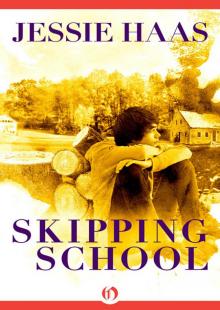 Skipping School
Skipping School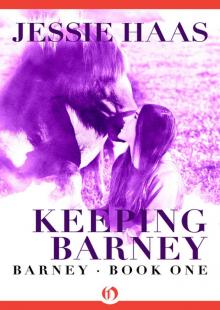 Keeping Barney
Keeping Barney Unbroken
Unbroken Westminster West
Westminster West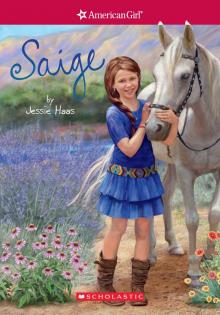 Saige
Saige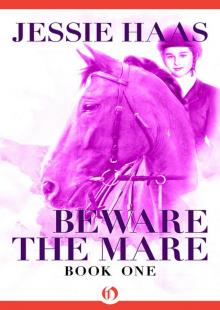 Beware the Mare
Beware the Mare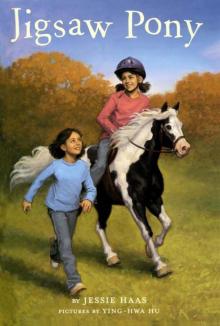 Jigsaw Pony
Jigsaw Pony Rescue
Rescue Saige Paints the Sky
Saige Paints the Sky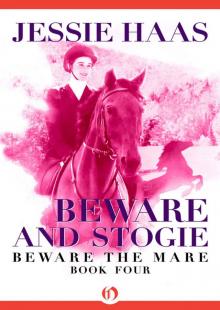 Beware and Stogie
Beware and Stogie Chico's Challenge
Chico's Challenge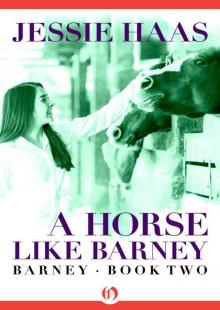 A Horse like Barney
A Horse like Barney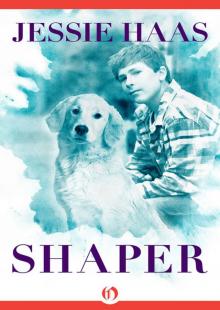 Shaper
Shaper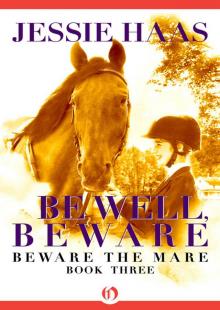 Be Well, Beware
Be Well, Beware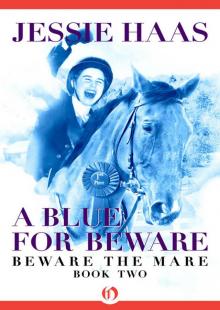 A Blue for Beware
A Blue for Beware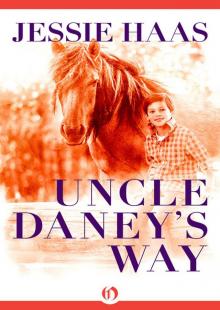 Uncle Daney's Way
Uncle Daney's Way